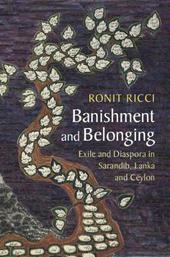
|
Banishment and Belonging: Exile and Diaspora in Sarandib, Lanka and Ceylon
Hardback
Main Details
| Title |
Banishment and Belonging: Exile and Diaspora in Sarandib, Lanka and Ceylon
|
| Authors and Contributors |
By (author) Ronit Ricci
|
| Series | Asian Connections |
|---|
| Physical Properties |
| Format:Hardback | | Pages:282 | | Dimensions(mm): Height 235,Width 156 |
|
| Category/Genre | Literary studies - general
Asian and Middle Eastern history |
|---|
| ISBN/Barcode |
9781108480277
|
| Classifications | Dewey:899.28 |
|---|
| Audience | | Professional & Vocational | |
|---|
| Illustrations |
Worked examples or Exercises; 3 Maps; 21 Halftones, black and white
|
|
Publishing Details |
| Publisher |
Cambridge University Press
|
| Imprint |
Cambridge University Press
|
| Publication Date |
21 November 2019 |
| Publication Country |
United Kingdom
|
Description
Lanka, Ceylon, Sarandib: merely three disparate names for a single island? Perhaps. Yet the three diverge in the historical echoes, literary cultures, maps and memories they evoke. Names that have intersected and overlapped - in a treatise, a poem, a document - only to go their own ways. But despite different trajectories, all three are tied to narratives of banishment and exile. Ronit Ricci suggests that the island served as a concrete exilic site as well as a metaphor for imagining exile across religions, languages, space and time: Sarandib, where Adam was banished from Paradise; Lanka, where Sita languished in captivity; and Ceylon, faraway island of exile for Indonesian royalty under colonialism. Utilising Malay manuscripts and documents from Sri Lanka, Javanese chronicles, and Dutch and British sources, Ricci explores histories and imaginings of displacement related to the island through a study of the Sri Lankan Malays and their connections to an exilic past.
Author Biography
Ronit Ricci is Sternberg-Tamir Chair in Comparative Cultures at Hebrew University of Jerusalem and Associate Professor of Asian Studies at Australian National University. She is the author of the multiple-prize-winning Islam Translated: Literature, Conversion, and the Arab Cosmopolis of South and Southeast Asia (2011).
Reviews'Challenging the boundaries that too often divide area studies, Ronit Ricci's linguistic skills and path-breaking research historicize the Malay presence in contemporary Sri Lanka. Juxtaposing the literary and imaginative world of travelling heroes and religious figures with the lives of individuals ranging from Java's princely exiles and their descendants to Malay soldiers in colonial armies, Banishment and Belonging is a true tour de force.' Barbara Watson Andaya, University of Hawai'i 'Banishment and Belonging layers multiple spatial and temporal imaginings and weaves them together to show how Sri Lanka became a significant geography for Malays, and how they made sense of Sri Lanka as at once a place of arrival and of colonial exile. This is Indian Ocean and global history at its best. An endlessly absorbing read.' Francesca Orsini, School of Oriental and African Studies, University of London 'Fascinated by questions of language and belonging, Ronit Ricci's new book on the island world now known as Sri Lanka, shows how 'exile and return' took many forms in the company and colonial worlds of British South Asia and Dutch Southeast Asia. This is a brilliant and thought-provoking new work by a very distinguished scholar.' Laurie J. Sears, Walker Family Endowed Professor, University of Washington 'Ronit Ricci has had to work, in her own words, with 'fragments', 'echoes', and 'imagination' to compose this fascinating history of longing and belonging in colonial Asia. It is a story based in formidable scholarship, yet told with grace and empathy.' Jonathan Spencer, Regius Professor of South Asian Language, Culture and Society, University of Edinburgh 'Banishment and Belonging is a superb feat of scholarship ... This is Ricci's great contribution. She brings empathy and acute insight to her work and allows access not just to a past world rarely seen but also to enduring human efforts to respond to the trauma of displacement and disruption through literature and religion.' Greg Fealy, New Mandala 'Ricci's book is a compelling account, beautifully written and full of original insights.' Nira Wickramasinghe, Society and Culture in South Asia
|